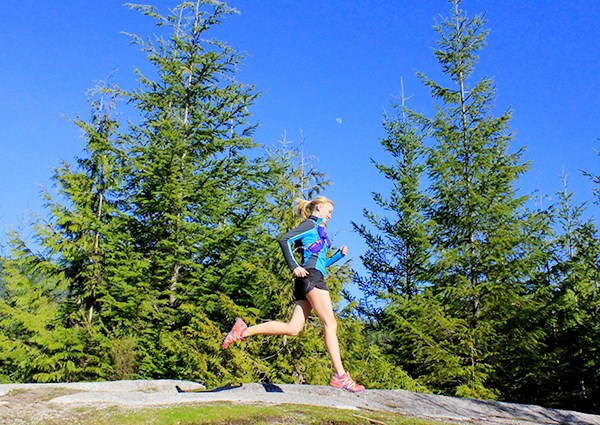For Niki Hurst, being diagnosed with Crohn’s disease might have provided an obstacle for her active lifestyle.
But as a trail runner, the Squamish woman tackles ultra-marathon distances and, surprisingly, uses her condition – an inflammatory bowel disease – as motivation to help her compete.
“You don’t associate chronic illness with athletic endurance,” she said.
Hurst started noticing something wrong in her mid-teens after she developed flu-like symptoms that persisted and which ended eventually with a diagnosis of Crohn’s disease. She felt sick for well over a year, and at one point, she was down to 80 lb.
“I was very, very, very sick,” she said.
With treatment, she went into remission, but she can still face the occasional flare-up.
“You will always have it, and it can always become an issue,” she said.
Crohn’s can present problems for Hurst with iron and hemoglobin, requiring her to take iron supplements. “You’re losing a lot of blood,” she said.
She takes intravenous injections rather than oral supplements, which prove to be a lot easier on her stomach, she says.
Most importantly, Crohn’s requires her to manage her stress, watch what she eats and keep up her active lifestyle.
“I had always been athletic… I had dabbled in running,” she said. She started running seriously about five years ago, beginning with marathons, but has now moved in ultra-marathons on trails, where she might run distances through the wild of 50 kilometres. This month, she is heading to Oregon for a 100-K event.
Usually she trains five to six days a week, sometimes for an hour during the week or as much as 10 hours a day on weekends.
Hurst feels lucky to live in Squamish, where she has found a community of trail runners that helps motivate her. “You’re in this community of people who are wildly passionate about it,” she said. “Squamish is such a supportive community.”
Still, running such long distances can present challenges for anyone, and Hurst admits she particularly has to focus on the mental aspects to help deal with the physical challenges.
“When you’re 80 kilometres in, it’s going to hurt,” she said.
Having to face Crohn’s means she has to be conscious of her body and its needs, such as hydration and nutrients. In this way, the condition actually helps keep her on track to keeping fit and in control of stress in her life.
Recently, she even signed on to become an athletic ambassador for the Crohn’s and Colitis Foundation of Canada. Last month, she gave her first motivational talk in Victoria about turning Crohn’s or colitis into a tool for growth. She will also be taking part in the Gutsy Walk fundraiser in Vancouver on June 5.
This weekend, she will be speaking at a symposium in Vancouver aimed at young people, who can often become embarrassed when facing a diagnosis of Crohn’s the same way she did at an early age. “They’re giving youth-specific talks, which is so important,” she said.
Hurst hopes to inspire them about the importance of taking control of life. “It’s not even just living with Crohn’s, it’s thriving,” she said.



